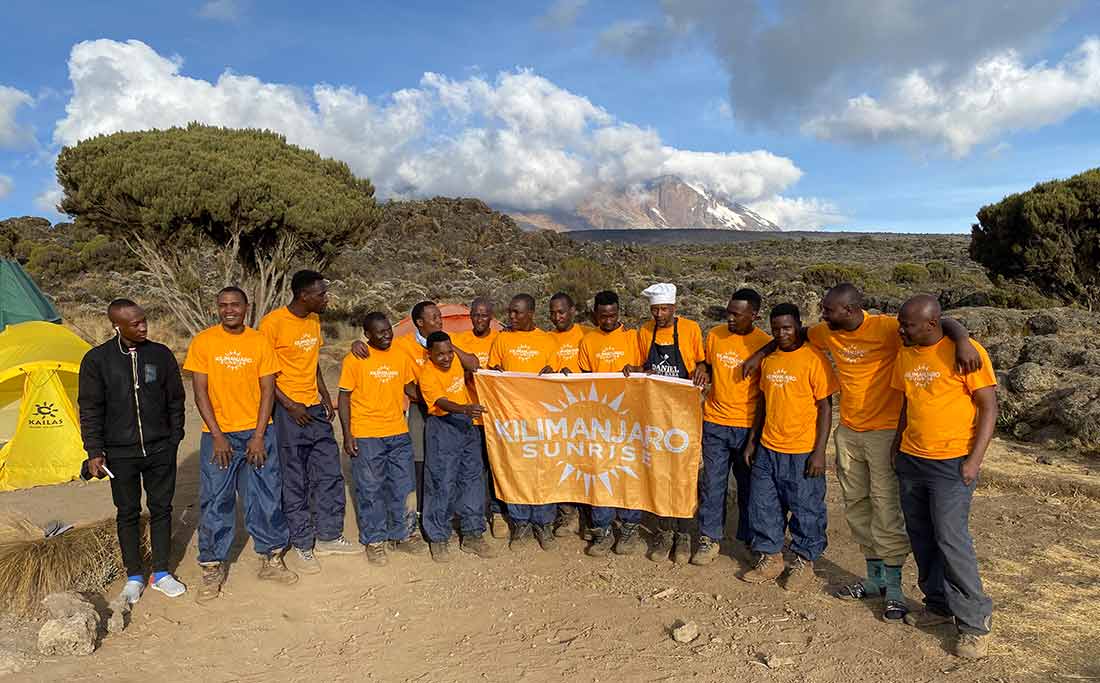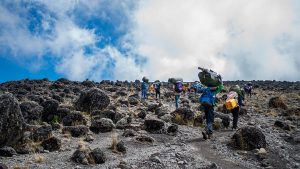When traveling to Tanzania, you should bring along enough money for tipping. We realize that not all cultures believe in tipping. But it is customary in Tanzania to tip.
This not only applies to your guides and porters on your Kilimanjaro climb, but also on safari, around town, and at the hotel.
So how much is a good tip and where and when should you tip?
Kilimanjaro Mountain Crew Tips
Let’s start with the largest tip. This is the tip you give to your mountain crew. After all, they did the hardest work and deserved the largest tips. But what is a good tip? We know that once it is all said and done, you’ll probably feel like the amount you give won’t feel like enough. However, the US Dollar goes a long way in Tanzania. So our staff will appreciate what you give them. You do not need to convert your money to Tanzanian Shillings.
To make tipping easier, we follow the Kilimanjaro Porters Assistance Program (KPAP) recommended guidelines on all aspects of guide and porter payments and welfare. KPAP publishes recommended tipping amounts for all operators.
Recommending tipping amounts for Climbing Kilimanjaro is the same no matter which route you end up choosing. You should tip;
- Guide: $25 per day
- Assistant Guide: $25 per day
- Cook: $15 per day
- Summit Porter $15 per day
- Porter: $10 per day
These amounts are per group of climbers NOT per climber. At the pre-climb trip briefing, you’ll find out the total size of your crew.
View the below table as a general guide.
| GROUP SIZE | 6 DAYS | 7 DAYS | 8 DAYS | 9 DAYS |
|---|---|---|---|---|
| 1 | $350 – $380 | $400 – $430 | $450 – $480 | $500 – $530 |
| 2-3 | $275 – $305 | $305 – $345 | $340 – $370 | $375 –$415 |
| 4+ | $200 – $230 | $220 – $250 | $245 – $275 | $270 – $300 |
If your climb is longer—eight or nine days—the number of porters will increase. They’ll need to bring more food. Also, if you have booked a private toilet there will be an additional toilet porter. He will carry the equipment and makes sure it’s kept clean.
Consequently, the total number of staff depends on how many climbers are in the group and the number of days on the mountain.
Mountain Crew Size
| CLIENTS | GUIDE | ASSISTANT GUIDE(S) | COOK(S) | PORTERS |
|---|---|---|---|---|
| 1 | 1 | 0 | 1 | 4 |
| 2 | 1 | 1 | 1 | 7 |
| 3 | 1 | 1 | 1 | 10 |
| 4 | 1 | 1 | 1 | 13 |
| 5 | 1 | 2 | 1 | 16 |
| 6 | 1 | 2 | 1 | 19 |
| 7 | 1 | 2 | 1 | 21 |
| 8 | 1 | 3 | 1 | 24 |
| 9 | 1 | 3 | 1 | 27 |
| 10 | 1 | 3 | 2 | 30 |
Still confused? Don’t worry we will cover tipping more in-depth at the trip briefing. If you want to know the number of people on your climb, keep an eye on it on the Dates and Prices page. We book a total of 10 people per climb.
TIPPING GUIDELINES
Additionally, at the trip briefing, you will be given instructions on how the tipping process works. The tips will be for the guides, cooks, and porters. Most groups discuss their tipping amounts collectively. The tips will be distributed to the crew later on.
There will be a tipping ceremony once you are off the mountain. One person in your group will be appointed to tell what each member of the mountain crew will receive for a tip. This is to keep everyone honest.
Afterward, there will be singing and celebration before heading back to the hotel.
TIPPING ON SAFARI
Furthermore, if you booked a safari, the general guideline for tipping during the safari is $25-$30 per day for the guide. For instance, on a 5-day safari, a good tip for the guide is $125-$150 regardless of the number of passengers.
TIPPING IN TANZANIA
Finally, people will carry your bags at various times throughout the trip. For example, a person will carry your bag at the lodge from the taxi to the lobby or your room. You can tip each person $1 USD if you like.
Final Thoughts
We know not everyone prefers to tip, but in the end, it is customary to tip in Tanzania. We hope this helps you decide how much to give your hard-working mountain crew, safari driver/guide, and anyone else that carries your bags for you.





